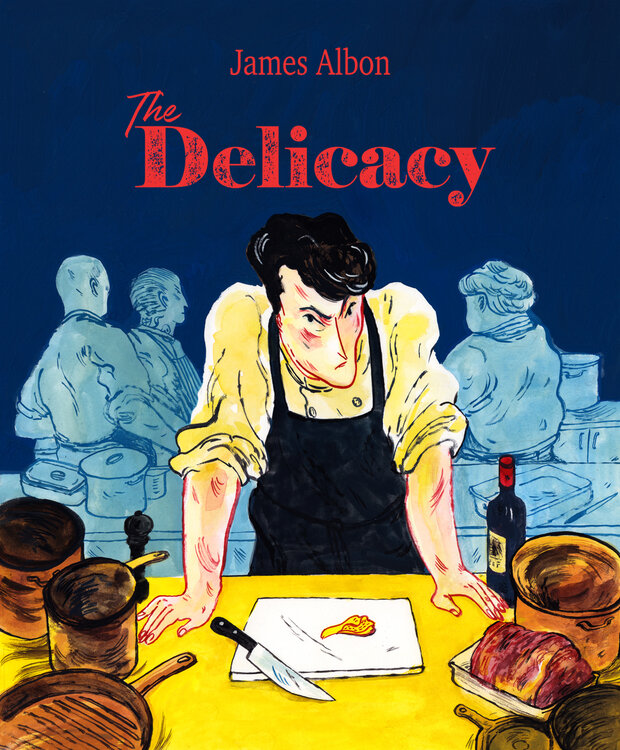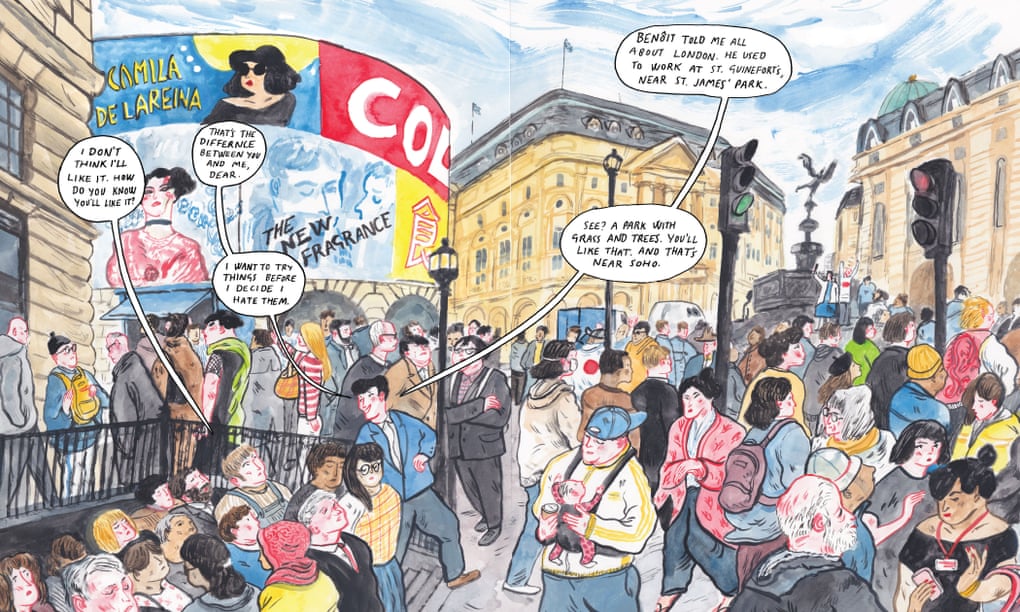
The American dream is to strike it big, right? We can all fool ourselves by saying that “people just want a better life for their kids than they had,” but what people really want, what they really really want, is to win the lottery. Case in point – how many people have you heard talking about NFTs and cryptocurrency recently? The get-rich-quick dream is a seemingly indelible part of human nature. Some of us would prefer instant stardom and riches to show up due to something we’ve made or done, but others would be happy to just take the blank check.
But what happens to the hopes and dreams of a person when confronted with this exact scenario? What hopes and dreams can survive in the face of overwhelming wealth and success? James Albon is here to explore this set of questions with his latest book, The Delicacy, published earlier this year by Top Shelf. Using the world of haute cuisine as a backdrop, Albon preps, cooks, and plates a story that explores the effect of greed and capital on the lives of two young men with dreams of striking out into the modern world.
Brothers Tulip and Rowan are Scottish boys, island-grown and isolated from fast food and microwaves. Rowan wants nothing more than to work the land and care for animals, but Tulip has dreams of London, of opening a restaurant, of being anywhere but where he’s from. With a sudden windfall from the estate of their mother’s sister, the pair has the golden opportunity to get off the island and strike out for the mainland. Once ensconced at their newly inherited home, Rowan gets to work turning the south-facing estate into a massive vegetable garden. It’s hard work, sweat, and tears that get them to the place where they can open up Tulip’s, a restaurant on the edges of London, right next to a Kebab shop and a lot of nothing else.

Rowan would be happy enough just to raise chickens and grow his massive garden, but it’s a mysterious ochre mushroom on the property that leads to the success of Tulip’s restaurant. The fungus itself seems like some kind of panacea – people who eat it get their energy back, have profound changes of heart, are almost miraculously healed from infirmities and other ailments. Running out of these mushrooms is a big problem, so Tulip and Rowan work hard to try and make sure they can continue to supply their foodie fans with a constant supply. Despite all of Rowan’s attempts to mulch, fertilize, and transplant them, though, the fungal beds don’t seem to propagate and nothing seems to work to bring about more fruiting bodies. All of this changes when Tulip has a run-in with a local gangster who seemingly has a heart attack while attempting to extort the newly flourishing restaurant. Tulip panics and ushers the corpse to the farmstead, where the two brothers bury the dead man in the back of the garden… and, lo and behold, mushrooms start to grow there too.
Once this overarching theme becomes visible, The Delicacy opens up like a blooming onion, all of its layers exposed (and neatly deep fried). The connection between greed and suffering starts to show itself in the little places, like when Tulip refuses to help a former friend keep his kebab restaurant open, and in the way he treats his brother. You can even see it in the progression of the page – as the restaurant changes from “Tulip & Rowan’s” to just “Tulip’s.” Rowan, isolated from his brother’s culinary cavalcade, finds evidence that the original plot of mushrooms have their roots in a violence born in the very home he has inherited, and, as the modern church so loves to claim, “the wage of sin is death.” No more apt a statement could be found to describe the chain of events that lead to The Delicacy’s tumultuous and upsetting ending.

It helps that Albon has a good handle on the details of kitchen life and home gardening, which he credits to various interviews with family and friends. The intricate detail of the backend of a restaurant and Albon’s gorgeous illustration keep the book moving at a brisk and heady pace. There’s a quickness to his line and an informal quality to his cartooning, and the effect is spectacular. As Tulip gets more involved in high-rolling restaurant schemes, his face and body become more contorted and malevolent. The cover image, of Tulip staring at the reader like a wraith over a single mushroom, is a strong indicator of what you’ll find throughout the book. Likewise, Albon’s characters appear more grotesque the nastier they are, and the result is something like a modern fairytale.
If I have any complaint about The Delicacy, it is that stories like this often have a moralistic perspective, and, if the work of James Albon often lands in the realm of the parable, that’s almost to be expected given his previous work. If The Delicacy functions as a modern parable, then he can be forgiven, since this parable is both razor-sharp and pleasantly bitter. I’m reminded of the stories of the Brothers Grimm, in a sort of 21st-century way; the grizzly nature and viciousness of those stories is all still intact in Albon’s work, just wearing a 3-piece suit rather than a king’s robe.
SOLRAD is made possible by the generous donations of readers like you. Support our Patreon campaign, or make a tax-deductible donation to our publisher, Fieldmouse Press, today.

Leave a Reply